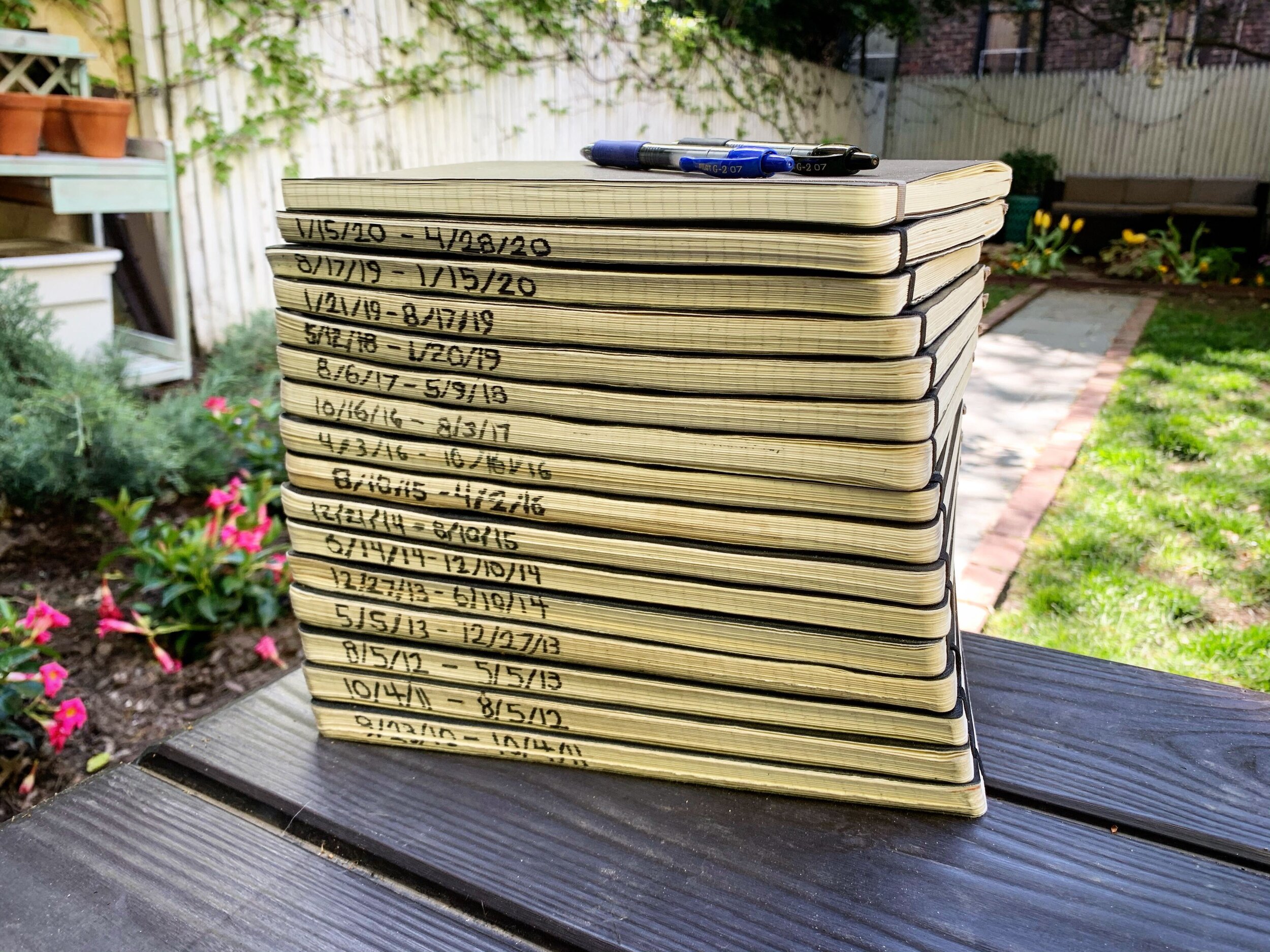What I learned about myself quite a while ago (I have notebooks and journals going back to 1997) is that for me a thought isn’t real or something that I have to address until I externalize it. If I play with the thought in my head, it bumps into too many other thoughts and doesn’t stand on its own. But when I get that thought out of my head, either through speaking it out loud to someone or through writing it down, it becomes something I can deal with, process, and build on. In my pursuit to be a life time learner, this has been one of the most important discoveries for me.
My notebook is a mishmash of journal entries and notes from meetings, personal and professional. It is with me in just about every meeting and is always in my bag. I’ll frequently just carry my notebook with me into a bar or restaurant when I have a hunch of an idea and see if it comes to me over a coffee, lunch, or a beer. In meetings, most people at the table have their laptops out, I have my notebook.
I have had a lot of folks ask me about my journaling and expressed a desire to have their own practice. I’ve never thought too much about it, but I wanted to share a couple of the things that I do that have made it such a sticky and valuable habit for me in hopes that they might give you some jumping off points for your next journal entry and creating the routine that works best for you.
STARTING
There is nothing as intimidating as the first blank page of a book full of blank pages. I have created a bit of a ceremony around my first page. I write the most important quote or lyric or Bible verse in my life right now on the inside of the cover of the notebook. In looking back over my past 15 notebooks, it is interesting to simply see what that quote was in my mind as I began. Then on the first page, I don’t write much of anything concrete, it is mostly just setting my intentions for this notebook and what I think will be the theme or the story arch over the next few months that are captured there (I average about seven months per Moleskine - but this last one was just over three months) These opening page intentions are really fun to reread also. The one I wrote on January 15th of this year at the beginning of my last notebook was almost comical given how much changed in the ensuing 100+ days.
The second scariest page is the next page. Always. But this is where the relationship begins. What you write on these next pages will never be seen by anyone else. These pages just became your least judgmental friend and can show the most truest reflection of you. This is your new home for what you actually really think. These can be for your full range of emotions and can be the first place you share hopeful moments and rage fueled expletive rants. It’s just for you to really say what you mean and write down what you feel, or at least what you think you feel. I often find that when I make that feeling concrete, ink to paper, it is often more extreme or not extreme enough. “Is that really what I think? No, I’m even angrier than those words convey!” Or “Is that what I really think? No, I’m whining, it is not that bad. But at least I got it out.”
HABITS
First things first, you don’t have to journal. Ever. But if you have a thought, if you have a memory, if you have an internal struggle, having a journal available to capture it is a beautiful thing. There is nothing too small to be memorialized in a journal. There is nothing to extreme that you can’t share. It is just for you. But, like most relationships, there is a comfort in the familiarity. If you haven’t written in a long time and you come back with a doozie of a intention or moment to share, you may find the first few pen strokes to feel foreign or like an intrusion on a friend who doesn’t have the rest of the context. But if you are frequently using your notebook for a whole range of different topics, to have a sounding board sitting next to you on your desk or as your treasure chest of ideas and themes and even notes from meetings and classes and online content, you’ll see more and patterns appear of what you choose to write down and what is important.
It may feel strange at first to write anything and everything down, but like most things, it is better to start broad and then work your way through the process to narrow it down to your own scope and your own niche of journaling. My journals have everything, profession, personal, spiritual, educational, financial, and artist (so many doodles next to notes.) But that is just because I know what it does for me and I have built up an appreciation for each of those aspects. It is my written train of thought some days. And it is exactly what I needed it to be, unedited and raw. I don’t ever go back and cross anything out or tear out a page, I write the next page and add more context, often even draw arrows back to the sentence in question.












